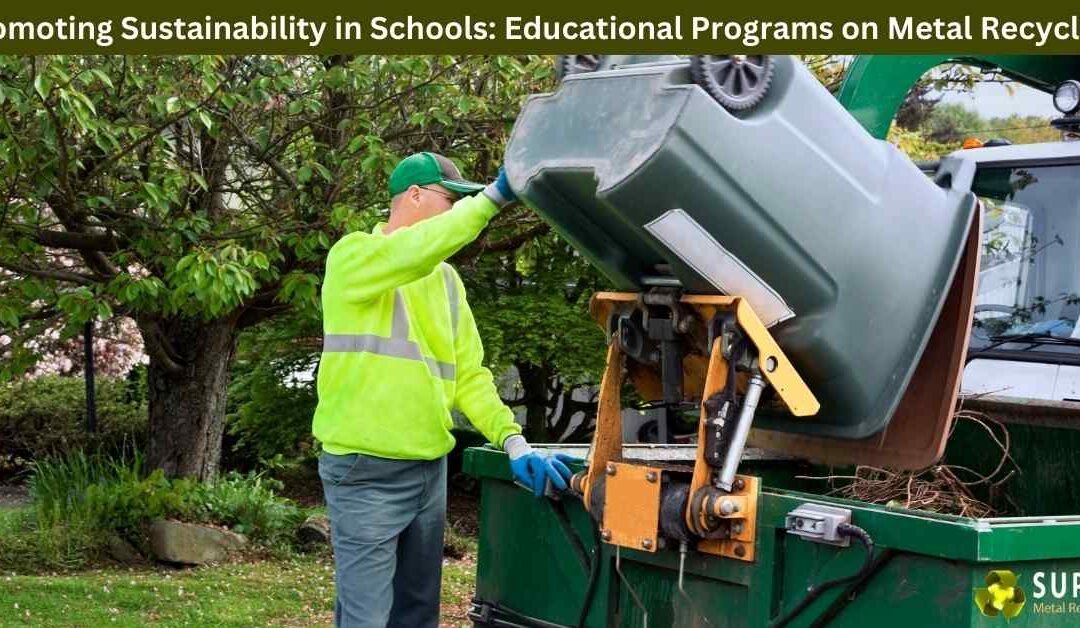As sustainability becomes a pressing global priority, schools have a unique opportunity to inspire the next generation of environmentally conscious citizens. One impactful way to promote environmental stewardship is by introducing educational programs focused on metal recycling. Through hands-on learning, creative projects, and community involvement, schools can equip students with practical knowledge about recycling metals and instill a lifelong commitment to sustainability.
Why Teach Metal Recycling in Schools?
Metal recycling is a powerful step toward reducing environmental impact and conserving resources. Metals like aluminum, steel, and copper are finite resources that can be endlessly recycled without degrading their quality. By teaching students about metal recycling, schools can:
- Raise Environmental Awareness: Students learn about the effects of mining and waste on ecosystems.
- Encourage Responsible Waste Management: Recycling metal helps students understand the importance of proper waste disposal.
- Develop Critical Thinking: Programs on recycling challenge students to think about sustainable solutions.
- Foster Community Engagement: Recycling projects can extend to local communities, encouraging broader participation.
Key Components of a Metal Recycling Program in Schools
Designing a program that is engaging and educational requires a mix of lessons, activities, and community partnerships. Here are some foundational elements to include:
1. Classroom Lessons on Metal and the Environment
Understanding Metals: Start with lessons that introduce different types of metals, focusing on both ferrous (iron-based) and non-ferrous metals. Students can learn where metals come from, how they’re used in everyday items, and the process of mining and refining.
Environmental Impact of Mining: Introduce topics like mining pollution, habitat destruction, and the depletion of natural resources. Discussing these impacts raises awareness about the importance of recycling metals to reduce the need for raw material extraction.
The Science of Recycling: Show students how metals are recycled and the energy savings it provides. For instance, recycling aluminum uses up to 95% less energy than producing new aluminum, making it an ideal material for reuse.
2. Hands-On Recycling Activities
Metal Collection Drives: Organize metal recycling drives where students can collect cans, scrap metal, and small household items. This not only gives them hands-on experience in recycling but also instills a sense of contribution toward waste reduction.
Sorting and Grading Workshops: Set up stations where students can sort different types of metals and learn about the grading system. They can use magnets to separate ferrous from non-ferrous metals, learn about the value of different grades, and understand why clean, uncontaminated metals are better for recycling.
Art and DIY Projects with Recycled Metals: Encourage creativity by using recycled metals in art projects or functional items. Students can create sculptures, jewelry, or practical objects, showcasing the possibilities of upcycling.
3. Partnering with Local Recycling Centers
Field Trips: Organize visits to nearby recycling centers where students can see firsthand how metals are processed and prepared for reuse. Field trips can include tours of facilities, demonstrations of sorting and melting processes, and Q&A sessions with industry experts.
Guest Speakers: Invite local recycling professionals or environmental activists to speak about the importance of metal recycling. Guest speakers can share insights on industry practices, environmental impact, and how students’ efforts make a difference.
Community Recycling Initiatives: Partner with local organizations to set up metal recycling bins in the community, encouraging students to lead a recycling campaign. This gives students a sense of ownership and responsibility toward sustainability.
4. Integrating Recycling Themes Across Subjects
Science and Environmental Studies: Use the metal recycling theme to teach concepts like energy conservation, chemistry (properties of metals), and ecology (mining impact on habitats).
Math and Economics: Introduce students to the economics of recycling by having them calculate energy savings from recycling versus producing new metal. They could also learn about the market value of different metals and understand the financial benefits of recycling.
Art and Design: In art classes, students can explore ways to create items from recycled materials. This reinforces the idea that recycling can lead to innovative and beautiful creations.
5. Measuring and Celebrating Success
Track Recycling Efforts: Set up a system to measure how much metal the school has recycled over the school year. Teachers can help students log the weight of metals collected, allowing them to see the tangible impact of their actions.
School Awards and Recognition: Celebrate students’ efforts by establishing awards or certificates for participation in metal recycling programs. Recognizing these achievements reinforces the value of sustainability and motivates continued involvement.
Share Success with the Community: Host a school event or assembly where students can present their projects and share their experiences with families and local community members. Sharing the program’s success can encourage the larger community to adopt similar practices.
Benefits of Metal Recycling Programs in Schools
- Environmental Impact: By promoting metal recycling, schools can help reduce landfill waste, conserve natural resources, and lower carbon emissions. These efforts directly contribute to a healthier planet.
- Student Empowerment: Hands-on recycling projects empower students by showing them that their efforts, however small, make a positive difference in the world.
- Lifelong Learning: Teaching recycling fosters responsible habits that students carry into adulthood. They become environmentally conscious citizens who understand the importance of sustainability.
- Community Engagement: School recycling programs can inspire parents, teachers, and community members to adopt sustainable practices, creating a ripple effect of positive environmental change.
Final Thoughts
By introducing metal recycling programs, schools can play a vital role in fostering a sustainable mindset in young people. When students understand the importance of recycling and experience its benefits firsthand, they’re more likely to grow into adults who make thoughtful, eco-friendly choices. With classroom lessons, community partnerships, and creative activities, schools can inspire future generations to care for the planet—starting with something as simple, yet impactful, as metal recycling.
If you are in Balwyn, Victoria 3103, and looking for a metal recycling service, this is the best way to visit us.
Super Metal Recycling
345 Frankston – Dandenong Road, Dandenong South VIC 3175
(03) 9706 4909


Recent Comments